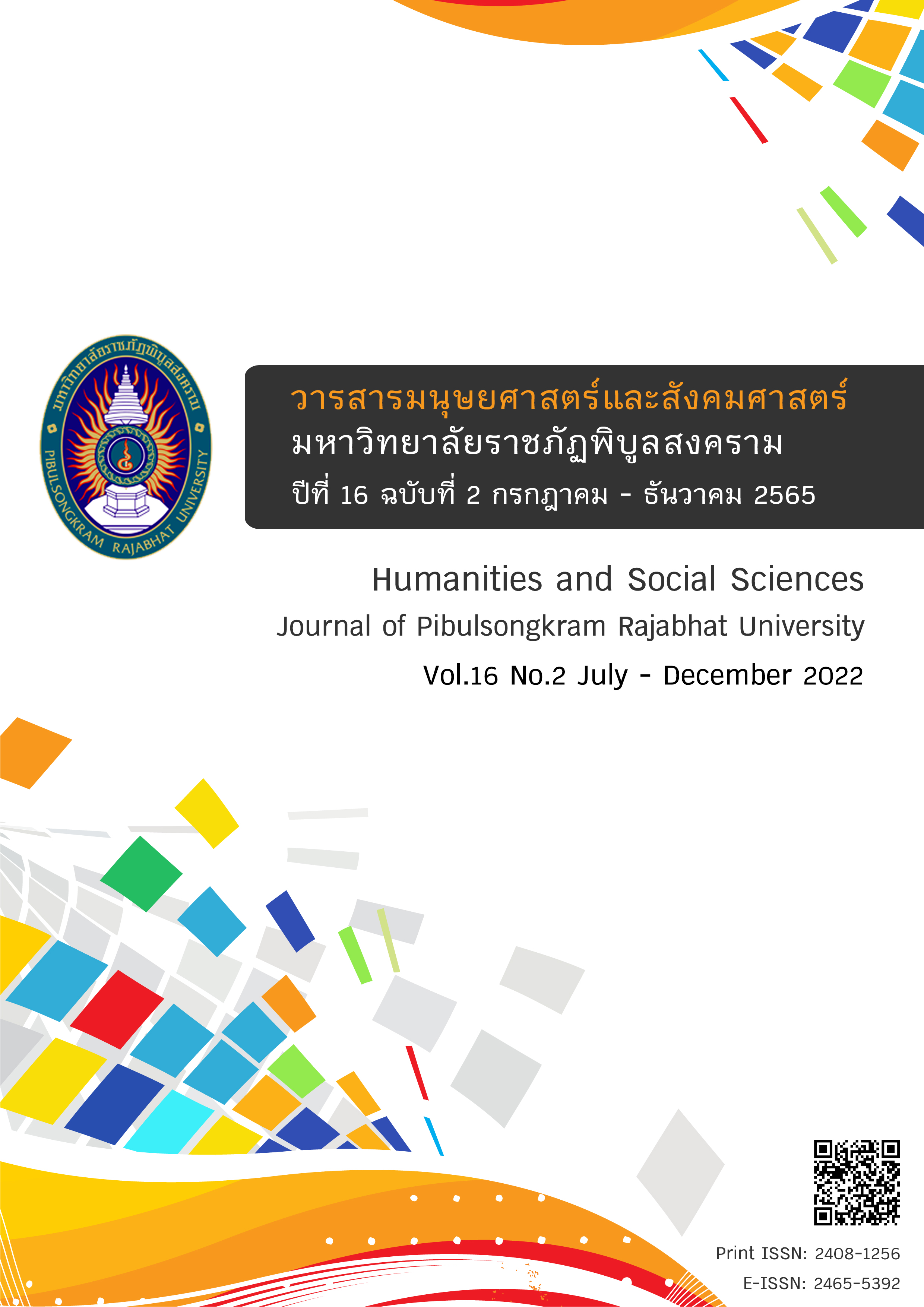Factors Affecting Tourists’ Loyalty in Health Tourism, Spa, in Andaman Region
DOI:
https://doi.org/10.14456/psruhss.2022.56Keywords:
Health tourism, Spa, Loyalty of touristsAbstract
The objectives of this research were 1) to study the level of opinion of the motivation, marketing experience, perceived value, satisfaction and the loyalty of tourists in the Andaman region. 2) Study the causal relationship of factors affecting the loyalty of of tourists in the Andaman region. This research is a quantitative research for the population, which consists of using spa services for foreigners in hotels and resorts in Andaman provinces such as Phuket, Phang Nga and Krabi, collected from clients of hotels, resorts and spas, which are foreign countries, including Russia, Australia, Germany and the United Kingdom. In this study, establishments did not clearly compile the number of users therefore, the exact population is not known selecting a sample class with a proportion from each of the 200 provinces, depending on the sample size indicates that 200 or more sample sizes can be used in the SEM. Analysis structural equation analysis by Lisrel 8.72. The study found that the model has a causal relationship that influences the loyalty of tourists. fit model reveals that the RMSEA is 0.066 NNFI is 0.93, CFI is 0.92, SRMR is 0.064, and the chi-square in degrees of freedom is in the model is 2.07. The results of the hypothesis test are as follows: 1) The satisfaction of tourists has a direct influence on the loyalty of tourists to tourist attractions, hotels and resorts in the provinces of the Andaman region. 2) The experience market has a direct influence on 3) The perceived value of tourist tourism has a direct influence on the loyalty of tourists and 4) Motivation in tourism has no direct influence on the loyalty of tourists
References
กระทรวงการท่องเที่ยวและกีฬา. (2561). สถานการณ์การท่องเที่ยวปี พ.ศ. 2560. สืบค้น 26 พฤษภาคม 2563, จาก http://www.362degree.com/2018/01/1622.
ณัฏฐวงศ์ ชาวเวียง และ วิชิต อู่อ้น. (2561). ปัจจัยเชิงสาเหตุที่มีอิทธิพลต่อพฤติกรรมของลูกค้าในธุรกิจสปาขนาดกลางและขนาดเล็ก. วารสารอัล- ฮิกมะฮ มหาวิทยาลัยฟาฎอนี, 8(11), 87-97.
ผู้จัดการออนไลน์. (2562). บทบาทไทยในฐานะผู้นำอาเซียน กับการยกระดับอุตสาหกรรมท่องเที่ยวเชิงสุขภาพ. สืบค้นเมื่อ 6 พฤศจิกายน 2562, จาก: https://mgronline.com/smes/detail.
สุรสิทธิ์ อุดมธนวงศ์. (2562). อิทธิพลของแรงจูงใจที่ส่งผลต่อผลสัมฤทธิ์การท่องเที่ยวเชิงกีฬาจังหวัดภูเก็ต กรณีศึกษาอีเวนต์มาราธอน. วารสารสุทธิปริทัศน์, 33(106), 236-248.
สำนักงานส่งเสริมการค้าในต่างประเทศ. (2563). โอกาสและขั้นตอนเปิดธุรกิจเปิดธุรกิจสปาในมาเลเซีย. สืบค้น 26 พฤษภาคม 2563, จาก http:// www.ditp.go.th.
Diamantopoulos, A., & Siguaw, A.D. (2000). Introducing LISREL: A guide for the uninitiated.Sage Publications, London.
Ching-Fu, C., Anna, L. & Sambath, (2016). Symbolic Experiential and Functional Consumptions of Heritage. Journal of Tourism Destinations, 18(6), 602–611.
Crompton, J. (1992). Structure of Vacation Destination Choice Sets. Annals of Tourism Research, 19(1), 420-434.
Cronbach, L. J. (1990). Essentials of Psychological Testing (5th ed.). New York : Harper Collins Publishers.
Ha, J., & Jang, S., S. (2010). Effects of Service Quality and Food Quality: The Moderating Role of Atmospherics in an Ethnic Restaurant Segment. International Journal of Hospitality Management, 29(2), 520-529.
Kline, R. B. (2011). Principles and Practice of Structural Equation Modeling (3rd ed.). New York: The Guilford Press.
Kotler, P., & Keller, K. L. (2012). Marketing Management (12th ed.). Edinburgh Gate: Pearson Education Limited.
Kozikowski, A. (2012). The Interaction Between Service Quality and Word-Of-Mouth on Service Quality Perceptions, Satisfaction, Loyalty, Value and Trust. (Doctoral dissertation). The Hofstra University.
Mai, K., & Nguyen, P. (2017). The Effects of Destination Image, Perceived Value, and Service Quality on Tourist Satisfaction and Word-of-Mouth - A Study in Ho Chi Minh City, Vietnam. International Journal of Trade, Economics and Finance, 8(5), 217-224.
Munhurruna, P., Seebalucka, P. (2015). Examining the Structural Relationships of Destination Image, Perceived Value, Tourist Satisfaction and Loyalty: Case of Mauritius. The 2014 International Conference on Strategic Innovative Marketing, IC-SIM 2014, (252- 259). Spain: Madrid.
Myung, J., Namho, B. & Choong, K. L. (2011). The Effect of Perceived Trust on Electronic Commerce: Shopping Online for Tourism Products and Services in South Korea. Journal of Tourism Management, 32(11), 256–265.
Pratminingsih, S. A., Astuty, E. & Widyatami, K. (2018). Increasing Customer Loyalty of Ethnic Restaurant Through Experiential Marketing and Service Quality. Journal of Entrepreneurship Education, 21(3), 214-215.
Putri, Y., A. Astuti, S. (2010). Analisis Pengaruh Experiential Marketing Terhadap Loyalitas Pelanggan Hotel “X” Semarang. Journal of Entrepreneurship Education, 12(2), 1-11.
Schmitt, B. H., & Rogers, L. (2008). Handbook on Brand and Experience Management. Northampton: Edward Elgar.
Schumacher, R. E., & Lomax, R. G. (2010). A Beginnerrs Guide to Structural Equation Modeling: SEM. New Jersey: Lawrence Erlbaum Associates.
Su, L., & Hsu, R. (2013). Service Fairness Consumption Emotions Satisfaction and Behavioral Intentions: The Experience of Chinese Heritage Tourists, Journal of Travel and Tourism Marketing, 30(8), 786–805.
Treesuwan, A. (2010). Study of Thai Tourists’ Characteristics in Traveling to Korea. Veridian E–Journal, 3(1), 232-244.
Uysal, M., & Hagan, L. (1993). Motivation of Pleasure Travel and Tourism. New York: Van Nostrand Reinhold.
Downloads
Published
How to Cite
Issue
Section
License
Copyright (c) 2021 Humanities and Social Sciences Journal of Pibulsongkram Rajabhat University

This work is licensed under a Creative Commons Attribution-NonCommercial-NoDerivatives 4.0 International License.
Any articles or comments appearing in the Journal of Humanities and Social Sciences, Rajabhat Phibulsongkram University, are the intellectual property of the authors, and do not necessarily reflect the views of the editorial board. Published articles are copyrighted by the Journal of Humanities and Social Sciences, Rajabhat Phibulsongkram University.









